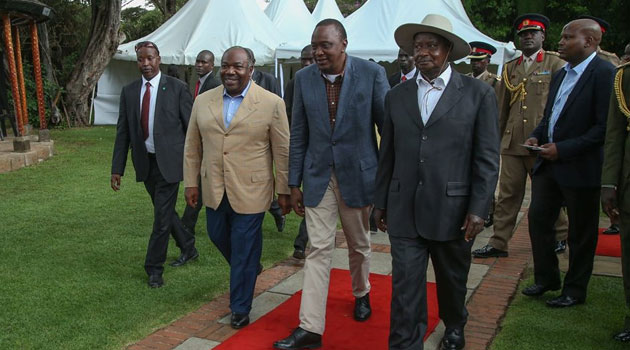
President Kenyatta said the provision in the convention that allowed countries to legally sell their ivory stockpiles sent the wrong message; that there would come a day when an elephant wouldn’t be worth more alive/PSCU
NAIROBI, Kenya, Apr 29 – President Uhuru Kenyatta on Friday announced that his government would be seeking a total ban on the sale of ivory at the Convention on International Trade in Endangered Species (CITES) meeting slated for Johannesburg in September.
President Kenyatta said the provision in the convention that allowed countries to legally sell their ivory stockpiles sent the wrong message; that there would come a day when an elephant wouldn’t be worth more alive.
“This will ensure African elephants are accorded highest level of protection,” he said.
Prior to which Kenya Wildlife Service (KWS) Chairman Richard Leakey made a call for all African countries with ivory stockpiles to follow Kenya’s example and get rid of them to send the unequivocal message that there should and would never come a time when it was not morally reprehensible to trade in ivory.
“Let’s kill the market once and for all. Let’s never again have ivory trade,” he urged.
He said the burning of 105 tonnes of elephant ivory on Saturday would also go a long way in sending that message. “Though they may not agree they will ask why did Kenya do that again?”
When former President Daniel arap Moi did it back in the 80s, he testified, it sent the value of ivory plummeting from 300 US Dollars a kilo to about five.
Now, he said, it went for a hundred times that amount at 500 US Dollars.
Gabon’s President Ali Bongo who was also present for the inaugural Giants Club Summit in Nanyuki said a kilo of forest elephant ivory went for over Sh200,000.
A lucrative market which, he said, had led to the slaughter of 10,000 forest elephants in the last decade. “Poaching has turned elephants into refugees.”
He said Gabon was therefore looking to learn from Kenya and its successes in addressing poaching.
He joked, for example, that he was quite eager to use fencing to keep elephants from damaging crops and by extension his electability. “I’ve been told that if I value elephants more than people, then maybe I should ask them to vote for me in the next elections.”
Uganda’s President Yoweri Museveni expressed similar sentiments saying his government was committed to adopting more land-effective farming methods so that the goals of development and conservation did not necessarily have to run counter to one another.
The three African leaders, President Kenyatta said, would preside over the torching of the 105 tonnes of ivory at the Kenya Wildlife Service Headquarters on Saturday in a further show of commitment to the preservation of the elephant species.









































